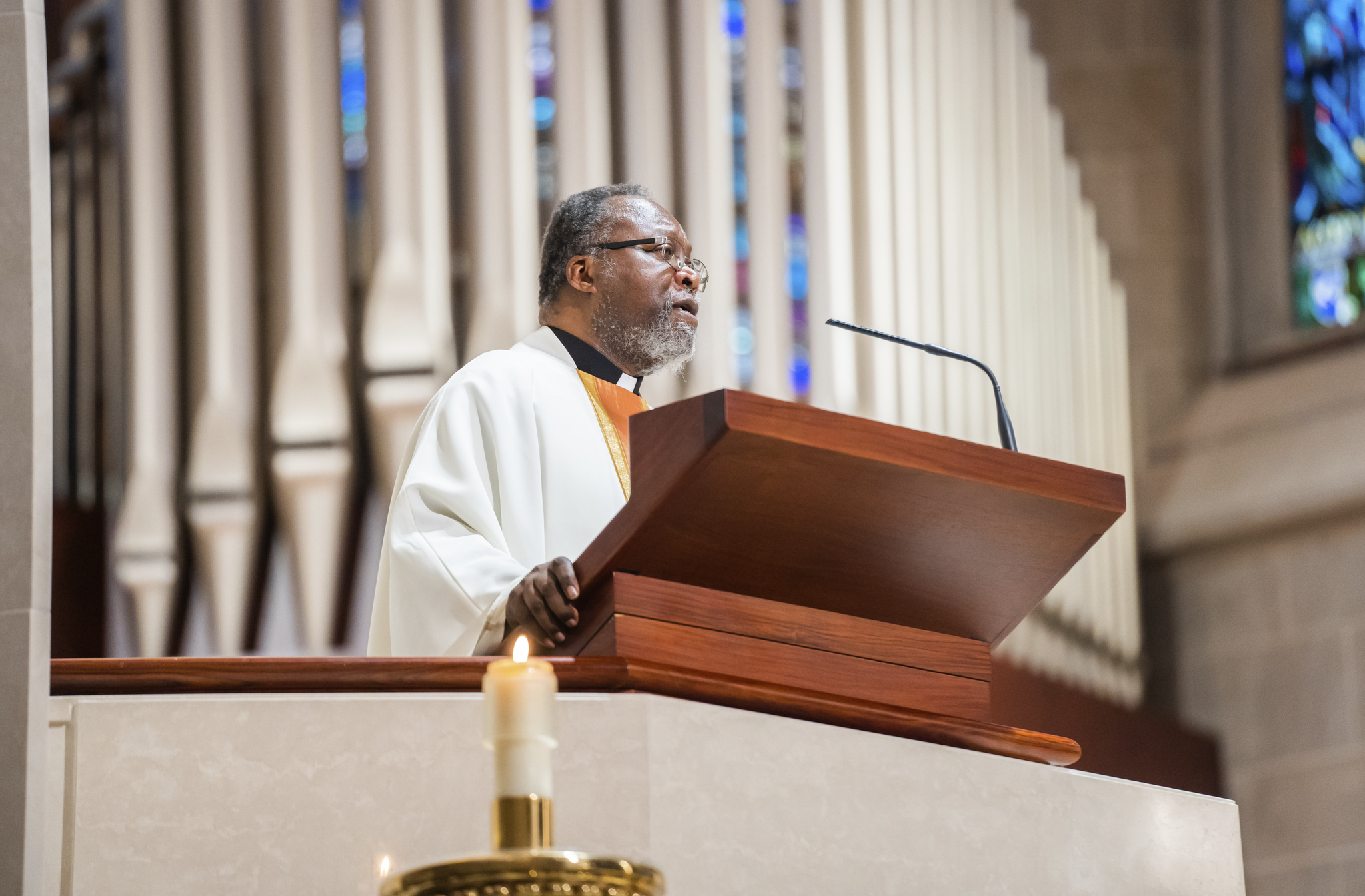Pastor of St. Charles Lwanga Parish recalls listening to civil rights leader in 1960s, implores Catholics to renew their mindset in justice and peace
DETROIT — After recounting his personal encounters with the Rev. Martin Luther King Jr., Fr. Theodore Parker called on the congregation to shed old ways of thinking to make room for a new way of justice, love and peace.
Fr. Parker, the pastor of St. Charles Lwanga Parish in Detroit, made his remarks during the Archdiocese of Detroit’s annual Mass honoring King’s legacy at the Cathedral of the Most Blessed Sacrament on Jan. 18.
The Mass, celebrated by Auxiliary Bishop Donald Hanchon, looked different this year. The church wasn’t full of school children — though full to capacity under COVID-19 gathering limits — but Fr. Parker’s homily rang throughout the sanctuary and in people’s homes via video livestream, reminding those listening why King’s legacy and work are as important now as they were in the 1960s.
Fr. Parker recalled listening to King speak in person when he was a senior in high school in 1962.

“As a high school senior, my mind was filled with anger, shame and self-doubt,” Fr. Parker said. “My mind was filled with hatred for a system that harmed me, for a system that killed Emmet Till in 1955, and for a system that harmed America.”
Fr. Parker said he couldn’t recall what King said that day, his mind and heart clouded with other things.
“My mind was closed to his thoughts of liberation and freedom because my background had been one of the old south,” Fr. Parker said. “As a young person, I had to realize patching over shame, patching over anger, personal inadequacies, hatred for white people, or hatred for a system would never lead me to true freedom.”
Fr. Parker turned to the day’s Gospel from St. Mark, in which the Pharisees confront Jesus about the fact that his disciples weren’t fasting. Jesus’ response is simple: if you have an old cloth, you don’t put a new patch of cloth over it. It will tear away. If you have new wine, you don’t pour it into an old, used and patched wineskin.

Despite the fact that racism has not been defeated and still persists today, Fr. Parker said that Christians cannot live without hope, joy and celebration.
The Pharisees had an attitude that was old, Fr. Parker said, and Christ implored them to take on a new attitude, a new mindset.
“Dr. King stood for a new way of thinking and a new kind of truth,” Fr. Parker said. “No longer could America keep two societies: one black and one white. Full equality must come for all citizens. The words of our Lord to us in today’s Gospel call us to be open-minded and to celebrate the joy that comes from a renewed heart.”
To be open-minded does not mean to be like a sieve that cannot retain new ideas, nor like a mind that is so set that nothing else can find its way in, Fr. Parker said, but rather to be open to that which is new.
“Too often, we in the Church hold onto our old wineskins, our old way of thinking, our old way of doing things,” Fr. Parker said. “Often, we are not aware of our subconscious addiction to racist-like talks, racist-like jokes, racist-like feelings and behaviors. Too often we are not the joyful missionary disciples we are meant to be.”
Fr. Parker noted that in many ways, the world today is not far removed from life in the 1950s and 1960s, referencing the recent surge of violence, distrust and division in the United States.

“It took years for me to appreciate the spiritual force of nonviolent resistance to social, political and economic evils,” Fr. Parker said. “It seems to take a lifetime for me and maybe even for all of us here gathered to work on what Dr. King called a ‘beloved community.’ America had to free its mind from the sin of racism; Americans had to see the terrible effects of racism on a whole class of people and its interconnection with all aspects of our lives.”
Despite the fact that racism still persists today, Fr. Parker said Christians cannot live without hope, joy and celebration.
“Every time we hear the liberating words of our Lord, we know that goodness, truth and beauty are on our side. If we are preparing to become a family of parishes,” Fr. Parker said, referencing the archdiocese’s renewal of parish structures, “let us take off our old garments of misunderstanding, of racism and cultural superiority and put on the garments of justice, love and peace.
“Let us fill our wineskins with deep concern for our neighbor, of deep concerns for politics, of deep concern over the health of family and our neighbors,” Fr. Parker added. “Brothers and sisters, today is the day as we reminisce and think about Dr. King to think concretely about our situation right now. Let us drink the wine of divine charity and peace.”









